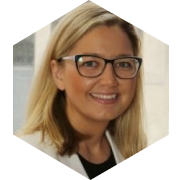In conversation with
Alex Ford, VP Operations @ Encompass


Founded in Australia in 2012 and established in the UK in 2015, encompass is growing rapidly and hiring new staff consistently. It is the creator of Know Your Customer (KYC) automation software for major financial and professional services firms globally, providing simultaneous, real-time access to multiple sources of global company and person data from which to build a picture of an organisation or individual.
In 2018 the UK organisation had a change of leadership team which provided an opportunity to deliver a framework that could help to empower people within the organisation to take ownership of their own lines of work. The framework should provide them with a line of sight to the overall objectives of the company so that they could clearly see how the tasks they were fulfilling were aligned to the business’ objectives. Having knowledge of the benefits of OKRs (objective & key results), encompass began looking for a facilitator who knew how to implement the framework and could help the organisation grow whilst ensuring that the teams stayed aligned with the new leadership teams’ objectives.



With an executive board of six directors, a management team of 12 and 80 employees, encompass retained There Be Giants, one of the only technology agnostic OKR consultancies in Europe, to work closely with VP of operations, Alex Ford to deliver the OKR framework.
The process began in a planning and strategy workshop with the executive team and was then rolled-out to the management team in the first instance, and subsequently rolled out to those teams who report into them. OKR ‘champions’ were also trained to help colleagues along the adoption and learning process, with skills training sessions scheduled too.
Kate McAleavey, product owner, encompass said: “The introduction of OKRs was a great way to get some perspective on where we want the business to develop, as well as grow. The training with our OKR champions and There Be Giants really helped us understand the purpose of OKRs and best practices, which assisted when creating our own.”
The framework was undertaken for a financial quarter and then reviewed. It was then conducted for a second quarter with different functional teams using the framework. The areas of the business to adopt OKRs were those where increased measurement or process improvement could be achieved and demonstrated including management, product owners, product managers, marketing and events personnel – but not every department across the organisation was included. The software development and sales teams haven’t adopted OKRs as yet – the development teams work to story points in Jira and the sales teams have specific targets and clear metrics to meet, so it didn’t make sense to overlay OKRs in the initial phase.




The OKRs are bringing better alignment to key initiatives and activities that make a difference to the future of encompass, as well as giving insight into how the organisation is moving forward with these.
Perhaps one of the biggest benefits that has happened as a result of implementing OKRs is the amount of time that is now set aside for having conversations across the business about priorities. OKR has become the “label” for the conversation to take place leading to deeper discussions about priorities and alignment. Everyone is committed to making it happen, so discussions that may have previously gone on the back-burner for something more pressing are being given priority and are taking place with regularity.
Alex Ford, VP of operations, encompass said: “What I have found difficult is how much time going through the process and doing it properly at the start of the quarter takes, although that’s warranted because the conversations about objectives are critical. What helps is now we have a useful framework to ensure they happen.
“Making sure we get appointments in the diary and time that is protected to focus on OKRs is crucial when it comes to success and is something that has really helped at an executive level, and as we have rolled them out across the company.
“So far, people have done really well. It has forced us to have planning conversations that we weren’t having before. People are responding well by making time and thinking further ahead. What I would say is, if last quarter was your first time setting them OKRs yourself, use it as a learning experience and apply those to this coming quarter. The more you do the better you will get.”
There Be Giants has also helped to expose where there may be a gap in communications in the chain where subsets of groups are aware of priorities but other people who needed to know, may not have been in the loop. OKRs has highlighted this and it can now ensure that everyone receives the communication required.
Other benefits include:
The organisation can be more realistic in its selection of priorities – what will really get done and really make a difference?
Success with OKRs came where objectives weren’t overly aspirational such that they can’t be realistically achieved, or where team members were less engaged.
OKRs bring increased regularity and structure to communications across the business – running across a financial quarter.
An understanding of the difference between KPIs and OKRs differentiates the framework and what it achieves. OKRs are like the Satnav – they guide on how to ‘get there’ and achieve success.
It’s been a boost for employees who have responded really positively – they can now see how they support the overall objectives of the business.
Alex Ford, VP of operations, encompass said: “Going forward, I hope that all managers get in a rhythm of discussing OKRs at the start of a quarter and giving clarity to their teams on what they should be working on and how it contributes to the overall aims. The process has meant the executive team have tighter cycles with managers now but there’s a little way to go on making sure managers have the time and capacity to go through that process with their own teams. OKRs cover some of the most important things we need to work on in order to get to where we want to be in the next 12-18 months.”
